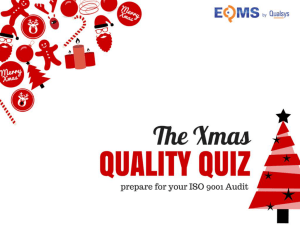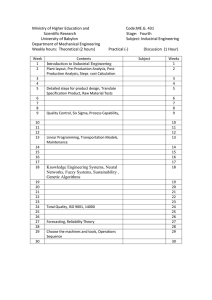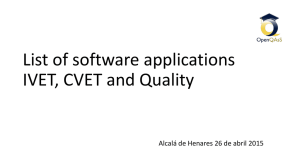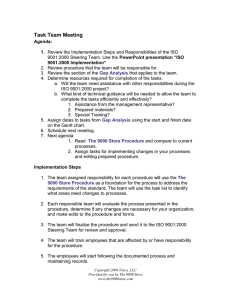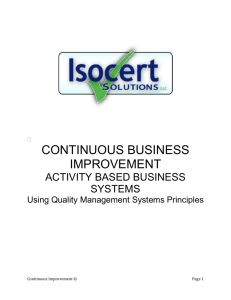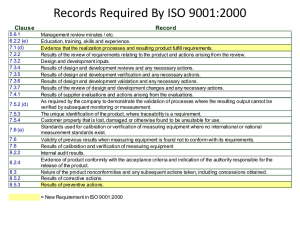8.0-Measurement,Analysis and Improvement
advertisement
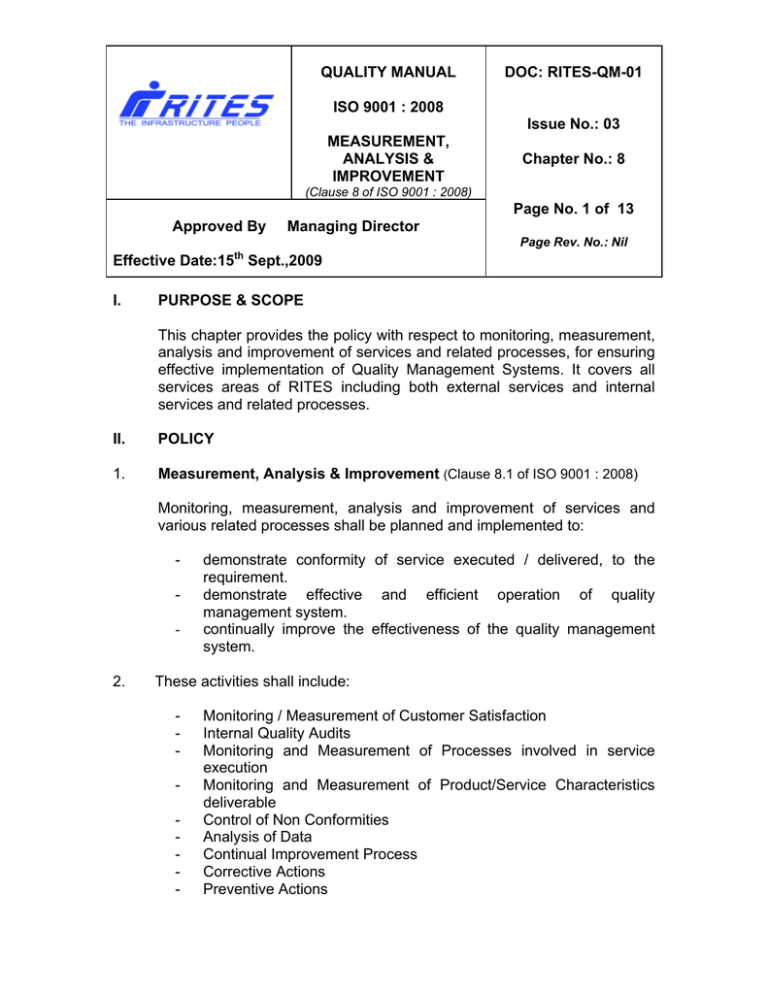
QUALITY MANUAL DOC: RITES-QM-01 ISO 9001 : 2008 Issue No.: 03 MEASUREMENT, ANALYSIS & IMPROVEMENT Chapter No.: 8 (Clause 8 of ISO 9001 : 2008) Page No. 1 of 13 Approved By Managing Director Page Rev. No.: Nil Effective Date:15th Sept.,2009 I. PURPOSE & SCOPE This chapter provides the policy with respect to monitoring, measurement, analysis and improvement of services and related processes, for ensuring effective implementation of Quality Management Systems. It covers all services areas of RITES including both external services and internal services and related processes. II. POLICY 1. Measurement, Analysis & Improvement (Clause 8.1 of ISO 9001 : 2008) Monitoring, measurement, analysis and improvement of services and various related processes shall be planned and implemented to: - 2. demonstrate conformity of service executed / delivered, to the requirement. demonstrate effective and efficient operation of quality management system. continually improve the effectiveness of the quality management system. These activities shall include: - Monitoring / Measurement of Customer Satisfaction Internal Quality Audits Monitoring and Measurement of Processes involved in service execution Monitoring and Measurement of Product/Service Characteristics deliverable Control of Non Conformities Analysis of Data Continual Improvement Process Corrective Actions Preventive Actions QUALITY MANUAL DOC: RITES-QM-01 ISO 9001 : 2008 Issue No.: 03 MEASUREMENT, ANALYSIS & IMPROVEMENT Chapter No.: 8 (Clause 8 of ISO 9001 : 2008) Page No. 2 of 13 Approved By Managing Director Page Rev. No.: Nil Effective Date:15th Sept.,2009 3. CUSTOMER SATISFACTION (Clause 8.2.1 of ISO 9001: 2008) 3.1 This policy shall be implemented by all units of RITES providing service to the external as well as internal customer. At corporate level Head, M&CS shall compile the data on customer satisfaction and put up periodical reports to MD. At SBU level, concerned SBU Heads shall ensure monitoring, determination & improvement of customer satisfaction. 3.2 Customer satisfaction being one of the main elements of the policy of RITES, all SBUs shall make regular proactive efforts for determination of customer perception of the services. This shall be done through activities such as Customer feedbacks on structured questionnaires, Customer meetings with clients, liaison etc suitable to the nature of business of the SBU. In addition assessment of customer satisfaction may also be made through data such as repeat orders secured, letters of appreciation, complaints, deficiencies pointed out in the service delivered, reports / design / drawings submitted to client. RITES web site shall also provide means to customer to provide feedback. 3.3 Head, M&CS shall provide regular inputs to MD, other functional Directors on Customer Perception of RITES Services. 3.4 All concerned SBUs shall take necessary actions for continual improvement of Customer Satisfaction. 4. INTERNAL QUALITY AUDIT (Clause 8.2.2 of ISO 9001: 2008) 4.1 This policy shall be implemented by Corporate Management Representative at Corporate level and SBU Management Representatives at SBU level. 4.2 Internal Quality Audits shall be planned, conducted, recorded and reported in line with the documented Corporate Procedure on the subject. Internal Audits shall comprise of Corporate Audits (planned, conducted, recorded QUALITY MANUAL DOC: RITES-QM-01 ISO 9001 : 2008 Issue No.: 03 MEASUREMENT, ANALYSIS & IMPROVEMENT Chapter No.: 8 (Clause 8 of ISO 9001 : 2008) Page No. 3 of 13 Approved By Managing Director Page Rev. No.: Nil Effective Date:15th Sept.,2009 and reported at Corporate level) and SBU level audits (planned, conducted, recorded and reported at SBU level). Corporate audits shall also cover SBU’s audits besides audits of Corporate level activities. Audits shall be planned to be carried out at specified frequency. In addition, depending on status / importance of the project or service or results of previous audits, further audits, comprehensive or partial may be planned. Audit Plans shall bring out audit criteria and scope clearly. 4.3 Internal auditors shall be trained and qualified. In addition a team of QMS Lead Auditors shall also be available whose services may be used to carry out effective audits of QMS at SBU as well as Corporate level. 4.4 The essential feature of all internal audit activities shall be objectivity and impartiality of audits to eliminate any element of bias. Auditors shall not audit their own work. 4.5 Internal audits shall be carried out in line with laid down procedure on the subject. ISO 10011-1 shall be used as the guide line document for conducting the audit. 4.6 To control the amount of subjectivity, bias, internal audits shall be carried out in teams as far as possible. As far as possible, it shall be attempted that at least one member of the team has similar work experience. 4.7 As a result of internal audits, areas of non-conformity shall be identified, documented and reported to auditee as well as to management personnel responsible for the area to enable Corrective / Preventive actions to be taken. 4.8 Auditees shall take timely corrective / preventive actions on nonconformities which shall be verified for effectiveness. 4.9 Results / trends of audits shall be reported for management review where they shall be evaluated to assess the effectiveness of system and to suggest system improvements. QUALITY MANUAL DOC: RITES-QM-01 ISO 9001 : 2008 Issue No.: 03 MEASUREMENT, ANALYSIS & IMPROVEMENT Chapter No.: 8 (Clause 8 of ISO 9001 : 2008) Page No. 4 of 13 Approved By Managing Director Page Rev. No.: Nil Effective Date:15th Sept.,2009 5. MONITORING & MEASUREMENT OF PROCESSES (Clause 8.2.3 of ISO 9001: 2008) 5.1 This policy shall be implemented at SBU level by all SBU Heads of RITES through their concerned project coordinators / activity heads. At Corporate / Divisional level, this shall be implemented by respective Divisional Heads / other Corporate level functionaries. 5.2 Clear identification of various QMS processes shall be done as a part of Quality planning bringing out desired outcome of the processes. Quality parameters as applicable to various Quality Management Processes shall also be defined. This planning shall be done at the time of project planning / planning for a service to be provided and brought as a part of applicable Project Plans / Procedures or other relevant documents. 5.3 Monitoring / measurement of the processes appropriate to the nature of the processes shall be carried out to determine the ability of the process to achieve the desired results. Monitoring and measurement shall bring out the extent of effectiveness and efficiency of the processes based on which corrections and corrective actions shall be decided. Monitoring and measurement of processes shall include: - Periodical Project Review including review on Completion of Projects by SBU/Heads & Divisional Heads - Monitoring for timely execution of project stages / services as per preagreed timeframe - Monitoring of quality of service at specific project stages as per project quality plans - Monitoring of inspections by controlling managers through examination of IE’s diary, surprise and supervisory inspections. - Reviews at the level of Divisional Heads etc. 5.4 Where suitable, analysis of the performance of the processes against defined quality parameters/ quality objectives shall be carried out to QUALITY MANUAL DOC: RITES-QM-01 ISO 9001 : 2008 Issue No.: 03 MEASUREMENT, ANALYSIS & IMPROVEMENT Chapter No.: 8 (Clause 8 of ISO 9001 : 2008) Page No. 5 of 13 Approved By Managing Director Page Rev. No.: Nil Effective Date:15th Sept.,2009 determine the performance trend and aid the process of corrective and preventive actions where the desired results are not obtained. 6. MONITORING & MEASUREMENT OF SERVICES (Clause 8.2.4 of ISO 9001: 2008) 6.1 This shall be implemented by concerned SBU Heads through Project Coordinator, activity heads, controlling managers. 6.2 Receiving inspection / verification of inputs: 6.2.1 Material inputs required for project execution shall be identified at project planning stage through relevant documents such as Bill of Material (BOM). 6.2.2 Material specifications shall be normally prescribed as per Indian Standards or Indian Railway Specifications / other specifications as per customer requirements. 6.2.3 The mechanism of Incoming material quality assurance shall be planned and documented to ensure inspection / testing / verification on receipt / pre receipt stages with clearly laid down acceptance criteria, based on applicable specification and application. 6.2.4 Incoming inspections shall be carried out by nominated RITES representatives / outside nominated agency if so required contractually. Alternatively, incoming material quality verification may be carried out based on activities such as examination of documents, product certification status, test certificates etc. 6.2.5 No material shall be released for usage in project unless its prescribed inspection / testing / verification has been carried out and conformance to specifications is established. QUALITY MANUAL DOC: RITES-QM-01 ISO 9001 : 2008 Issue No.: 03 MEASUREMENT, ANALYSIS & IMPROVEMENT Chapter No.: 8 (Clause 8 of ISO 9001 : 2008) Page No. 6 of 13 Approved By Managing Director Page Rev. No.: Nil Effective Date:15th Sept.,2009 6.2.6 Verification, examination / evaluation of services received from external service providers shall be carried out to ensure fulfillment of specified requirements. 6.2.7 Nature and amount of inspection / verification shall be dependent on the type of material, its effect on the overall quality of works, and the degree of assurance provided by the supplier through product certification / test reports /certificates etc. 6.2.8 Records of receiving inspections / verification shall be maintained. 6.3 In-process Quality Control of Service: 6.3.1 In process inspection / verification / monitoring of service at various relevant project stages shall be planned during Project planning / through documented procedures etc. 6.3.2 It shall be ensured that designated personnel from RITES / other agencies as per Project Quality Plan / documented procedures carry out the prescribed checks. These may be in the form of verification / crosschecking of project stage and relevant documents, project reviews etc. Records of inspection / testing / monitoring as prescribed shall be maintained which may be further verified by designated RITES personnel from project teams. 6.3.3 Conformance to prescribed requirements shall be established as per laid down requirements at specified stages. Verification Hold Points, if any shall be identified to ensure verification activity at these points. 6.4 Final Inspection: 6.4.1 Final inspection activity shall be planned to be carried out at completion / handing over stage or a major phase of a project or service. The final inspection / verification / review activity, its methodology, responsibility etc. shall be documented through plans / procedures. It may involve: QUALITY MANUAL DOC: RITES-QM-01 ISO 9001 : 2008 Issue No.: 03 MEASUREMENT, ANALYSIS & IMPROVEMENT Chapter No.: 8 (Clause 8 of ISO 9001 : 2008) Page No. 7 of 13 Approved By Managing Director Page Rev. No.: Nil Effective Date:15th Sept.,2009 - Individual testing / inspection of various equipment / installation Test runs for signaling, electrical, safety mechanism etc. as applicable. Trial runs at prescribed load / frequency or under other similar conditions. Test checks for accuracy. Review / verification of project reports, design plans, etc.. 6.4.2 Independent checks may also be required to be made by regulatory authorities such as Commissioner of Railway Safety based on verification of records, certificates, inspection / testing. Wherever applicable, certification of conformity from the regulatory authority shall be obtained before project handover. 6.4.3 Verification of inspection / test results of incoming, in process stages shall also form a part of final inspection. Final handing over of the project deliverables shall not take place until the required evaluations have been successfully completed as planned unless otherwise approved by a relevant authority, where applicable, by the customer. 6.4.4 Records of monitoring & measurements shall be maintained to complete the evidence of the activities performed and results obtained. Records shall indicate the authority authorizing / clearing, release of project / service deliverables. 6.5 6.5.1 Guidelines for Construction Project Management For Construction Projects, Guidelines covering various aspects of Project Management have been laid down. It includes mandatory tests to be conducted on materials used in construction, check features for inspecting officials, responsibilities of site engineers at various stages in construction projects including checking / inspection / monitoring responsibilities, co-ordinating officer’s responsibilities including checking / inspection / monitoring responsibilities etc. QUALITY MANUAL DOC: RITES-QM-01 ISO 9001 : 2008 Issue No.: 03 MEASUREMENT, ANALYSIS & IMPROVEMENT Chapter No.: 8 (Clause 8 of ISO 9001 : 2008) Page No. 8 of 13 Approved By Managing Director Page Rev. No.: Nil Effective Date:15th Sept.,2009 6.5.2 As per the guidelines it is incumbent on the various officers concerned with the work to inspect the works frequently to ensure that works are in general being executed according to the design, drawings and specifications laid down in the contract and aspects of safety, environment, accountal, maintenance of records, mandatory tests etc. Periodicity of inspections is also laid down for project co-ordinator, SBU Head and other project functionaries. 6.5.3 It shall be ensured that provisions of these guidelines are complied with in all construction projects in which RITES is involved as project management consultant on supervision basis or project management consultant deposit / turnkey basis. 7. CONTROL OF NON-CONFORMITY 7.1 This policy shall be implemented by all SBU Heads through Project Coordinators / activity heads. 7.2 Documented Corporate procedure exists to provide control through activities such as identification, documentation, evaluation, segregation / isolation (where practicable) and disposition of all non-conformities observed related to materials / works /services/ project / relevant documents. Main focus shall be on early detection & communication to those concerned, so that adverse effect of non-conformances can be minimized. 7.3 Review & Disposition: The documented procedures shall bring out responsibilities and authorities for dealing with non- conformities. Depending upon its likely effect and significance, the non-conformity noticed shall be reviewed at the appropriate level. QUALITY MANUAL DOC: RITES-QM-01 ISO 9001 : 2008 Issue No.: 03 MEASUREMENT, ANALYSIS & IMPROVEMENT Chapter No.: 8 (Clause 8 of ISO 9001 : 2008) Page No. 9 of 13 Approved By Managing Director Page Rev. No.: Nil Effective Date:15th Sept.,2009 Review shall take into account relevant facts / information. Depending upon situation, review authority may decide to: a) b) c) Rework / repair / rectify the non-conforming work / materials / documents etc to meet the specification Authorize the use, release or accept the non-conforming work / materials / documents etc under concession. Reject the material/ service deliverable / work done which shall be scrapped or not allowed to be used as service / project deliverable. Wherever any financial implications are involved necessary approvals shall be obtained from SBU Head/ Higher authorities. Records of non conformities including proposed repair / rework or concession shall be documented and communicated to concerned personnel for implementation. Any acceptance of works under concession shall be done with the approval of an appropriate authority / as per contractual requirement by client. Reworked / Repaired materials / works / service deliverable (documents etc.) shall be re-inspected for their conformity before clearance. When non - conformity is detected after handing over of the project / service deliverables, suitable action shall be taken appropriate to the effect, or potential effect, of the non - conformity. 8. ANALYSIS OF DATA (Clause 8.4 of ISO 9001: 2008) 8.1 This policy shall be implemented by all SBU Heads of RITES at the SBU level. Concerned Divisional Heads shall be responsible for analysis of performance data of their Division. At corporate level identified functionaries as given below shall be responsible for collection and QUALITY MANUAL DOC: RITES-QM-01 ISO 9001 : 2008 Issue No.: 03 MEASUREMENT, ANALYSIS & IMPROVEMENT Chapter No.: 8 (Clause 8 of ISO 9001 : 2008) Page No. 10 of 13 Approved By Managing Director Page Rev. No.: Nil Effective Date:15th Sept.,2009 compilation and analysis of the relevant data from various SBU’s and reporting the same to Functional Directors for their review: ¾ Financial Performance: Nominated Finance Head ¾ Monthly Business Performance Report: Company Secretary ¾ Customer Satisfaction Data: Head M&CS 8.2 Each unit shall collect compile and analyse their relevant data, indicative of their performance, such as: ¾ ¾ ¾ ¾ ¾ ¾ Financial Performance data Business Performance data Project Execution Status Customer Satisfaction related data Supplier Performance related data Data regarding conformity to service requirements / fulfillment of contractual commitments ¾ Data providing trends of key processes / service characteristics Information compiled shall be reviewed by Unit Heads to determine any adverse performance trends and decide improvements. As required the relevant data analysis shall be placed to other senior level functionaries including Divisional Heads for review. 8.3 At Corporate level data shall be compiled for: ¾ Financial Performance Report ¾ Monthly Progress Report covering status of ongoing activities of the company ¾ Review of Achievement of MOU & Corporate Plan Targets ¾ Annual Report, etc. QUALITY MANUAL DOC: RITES-QM-01 ISO 9001 : 2008 Issue No.: 03 MEASUREMENT, ANALYSIS & IMPROVEMENT Chapter No.: 8 (Clause 8 of ISO 9001 : 2008) Page No. 11 of 13 Approved By Managing Director Page Rev. No.: Nil Effective Date:15th Sept.,2009 8.4 Data collected shall be analyzed for which as necessary statistical techniques may be applied. Results shall be recorded, reported and areas needing system correction, improvements shall be identified with the goal of continuous quality improvement and customer satisfaction, business growth. 9. CONTINUAL IMPROVEMENT (Clause 8.5.1 of ISO 9001: 2008) 9.1 The responsibility for Continual Improvement of the effectiveness of the QMS rests with every one in the organization. This policy shall be implemented by all SBU Heads and Divisional Heads / other senior officers in their respective areas of operation. Continual Improvement is one of the most important elements of the policy of RITES. A Continual Improvement philosophy is deployed throughout the Organisation, to continually improve the quality of services provided, efficiency and effectiveness of various processes involved including the effectiveness of QMS implemented. Opportunities for improvement shall be identified through various mechanisms such as reviews of Corporate Plan, Business Results, MOU Targets, Quality Policy, Quality Objectives, Management Review, Audit Results, Data on various areas of performance including project / service execution, Corrective & Preventive actions, Customer Complaints & Feed Back, Customer Satisfaction, etc.. Improvements planned shall be implemented in a time bound manner, which shall be regularly monitored. 10. CORRECTIVE ACTIONS (Clause 8.5.2 of ISO 9001: 2008) 10.1 This policy shall be implemented by all SBU Heads and Divisional Heads / other senior officers in their respective areas of operation in line with documented Corporate procedure on the subject. QUALITY MANUAL DOC: RITES-QM-01 ISO 9001 : 2008 Issue No.: 03 MEASUREMENT, ANALYSIS & IMPROVEMENT Chapter No.: 8 (Clause 8 of ISO 9001 : 2008) Page No. 12 of 13 Approved By Managing Director Page Rev. No.: Nil Effective Date:15th Sept.,2009 10.2 Corrective actions shall be decided at appropriate level in the organisation depending on the gravity, complexity and nature of problem, its financial repercussions, effect on the business and image of the organisation. 10.3 In all matter, customer / client’s views and image of the organization shall be accorded pre-eminence, where appropriate client shall be involved in the process of identification / determination of actions. 10.4 Documented System shall be in place for ensuring effective corrective actions. Timely corrective actions shall be taken to eliminate the causes of existing non-conformities in order to prevent recurrence, covering: a) b) c) d) e) f) Effective handling of customer complaints, adverse feedback and reports of work related non-conformities. Investigation of the cause of non-conformities and recording the results of the investigation and evaluating the need for corrective action to ensure that non-conformities do not recur. Determination of the corrective action needed to eliminate the cause of non-conformities. Application of controls to ensure that corrective action is taken. Maintenance of records of the results of action taken. Ensuring effectiveness of the corrective actions through reviews. 11. PREVENTIVE ACTIONS (Clause 8.5.3 of ISO 9001 : 2008) 11.1 This policy shall be implemented by all SBU Heads and Divisional Heads / other senior officers in their respective areas of operation in line with documented Corporate procedure on the subject. 11.2 The need for Preventive Actions to eliminate the cause of potential nonconformities shall be assessed through analysis and review of performance trends, data and related reports such as the reports of quality system audits, management review, data on service characteristics, process characteristics, financial and business performance, trends with QUALITY MANUAL DOC: RITES-QM-01 ISO 9001 : 2008 Issue No.: 03 MEASUREMENT, ANALYSIS & IMPROVEMENT Chapter No.: 8 (Clause 8 of ISO 9001 : 2008) Page No. 13 of 13 Approved By Managing Director Page Rev. No.: Nil Effective Date:15th Sept.,2009 respect to achievement of objectives & targets, customer feedback, complaint data, etc.. 11.3 The causes of potential non- conformities shall be investigated; evaluation of need for action shall be done. Preventive actions shall be decided at appropriate level in the organization depending on the gravity, complexity and nature of problem, its financial repercussions, effect on the business and image of the organization. Action decided shall be implemented. Reviews shall be carried out to ensure that preventive actions are effective. Records of results of preventive actions shall be maintained. 12. REFERENCES: Procedure for Assessment of Customer Satisfaction Procedure for Internal Audits Procedure for Non-Conformity Control and Corrective & Preventive Actions Procedure for Performance Review SBU level procedures on process control, project planning and execution and project plans. SBU level procedures on incoming, in process, final inspection, Quality Control, etc. Guidelines for Construction Project Management. C/P/07 C/P/03 C/P/05 C/P/06
